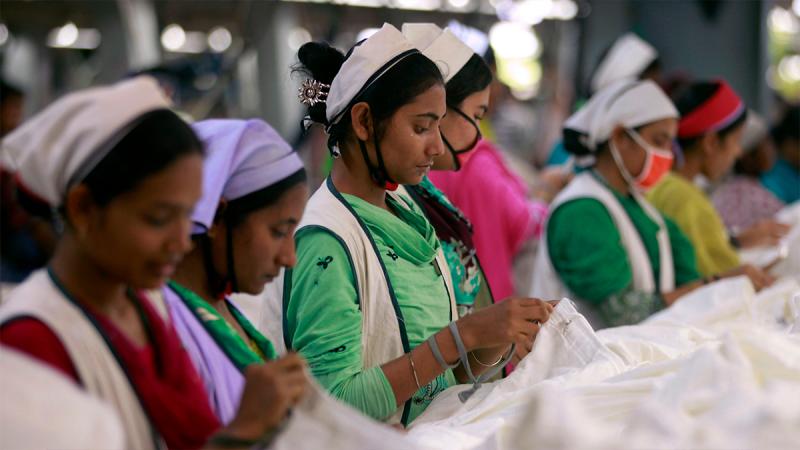 Private sector has vehemently opposed expansion of compact sustainability coverage to non-RMG exporting or non-exporting sectors.
Private sector has vehemently opposed expansion of compact sustainability coverage to non-RMG exporting or non-exporting sectors.
It also feels that the compact sustainability, agreed after the Rana Plaza tragedy to revamp only RMG sector in 2013, should come to an end when it fulfills the requirement of the text.
The fifth review meeting of the Compact will be held in Brussels on June 25 when Commerce Minister Tofail Ahmed will lead a delegation to evaluate the present situation of the RMG sector and future work plan with other stakeholders including the European Union and the US, the biggest two buyers of Bangladeshi products.
President of Bangladesh Garment Manufacturers and Exporters Md Siddiqur Rahman said, “I think that there is no need to extend the compact coverage other than RMG sector.”
Compact sustainability is unique and no other country has such provision and it should end when all the provisions agreed in the text are achieved, he added.
The Bangladesh Sustainability Compact brings together the European Union (EU), Bangladesh, the US, Canada and the International Labour Organisation (ILO) with the common goal of improving working conditions and the respect of labour rights in Bangladesh’s ready-made garment industry to ensure that industrial disasters such as the Rana Plaza tragedy are not repeated.
To do this, the Compact is built on short and long-term commitments related to three inter-linked pillars: respect for labour rights; structural integrity of buildings and occupational safety and health; and responsible business conduct.
The BGMEA chief said, “It has three pillars, but they only talked about the first two and there is no progress in responsible business conduct area.”
They talk about fair salary and wage, but in return they are not ready to give us fair price, said the lamented businessman.
Bangladesh is one of the cheapest sources of RMG products and exports over $28 billion worth of such goods to the EU, US and other markets.
A unified code of conduct should be respected by all buyers as it is needed for hassle-free RMG business in Bangladesh, Siddiqur Rahman said.
Citing example, he said, if a factory works for five buyers, each of them has separate demands on safety and other issues, which create problems for the owner.
About the extension of Accord and Alliance, which represent European and American buyers, he said, “We gave them a transitional extension of six months which will expire this year.
“We expect that they will leave this year as it was agreed that after launching of Remediation Coordination Cell (RCC), it would take over Accord and Alliance operations.”
The RCC was launched May last year.
Subscribing similar views, Bangladesh Employers’ Association Secretary General Farooq Ahmed, “The compact has no mandate to expand its coverage to other sectors.”
About the uncertainty over outcome document after the discussion on Jun 25, he said, “Whenever such a big meeting is held, everybody expects a joint written document, but we are still not sure about this year’s arrangement.”
In the last four compact, joint statements were issued.
About the expiry of the Compact, he said, “Certain tasks are yet to be achieved and it will come to an end after fulfilling those.”
 Business
Business
41084 hour(s) 49 minute(s) ago ;
Afternoon 03:43 ; Tuesday ; Jun 24, 2025
Pvt sector opposes expansion of compact coverage
Send
Sheikh Shahariar Zaman
Published : 08:00, Jun 21, 2018 | Updated : 08:00, Jun 21, 2018
Published : 08:00, Jun 21, 2018 | Updated : 08:00, Jun 21, 2018
0 ...0 ...
/ssz/
Topics: Top Stories
- KOICA donates medical supplies to BSMMU
- 5 more flights to take back British nationals to London
- Covid19: Rajarbagh, Mohammadpur worst affected
- Momen joins UN solidarity song over COVID-19 combat
- Covid-19: OIC to hold special meeting
- WFP begins food distribution in Cox’s Bazar
- WFP begins food distribution in Cox’s Bazar
- 290 return home to Australia
- Third charter flight for US citizens to return home
- Dhaka proposes to postpone D8 Summit
Unauthorized use of news, image, information, etc published by Bangla Tribune is punishable by copyright law. Appropriate legal steps will be taken by the management against any person or body that infringes those laws.
Bangla Tribune is one of the most revered online newspapers in Bangladesh, due to its reputation of neutral coverage and incisive analysis.
F R Tower, 8/C Panthapath, Shukrabad, Dhaka-1207 | Phone: 58151324; 58151326, Fax: 58151329 | Mob: 01730794527, 01730794528






